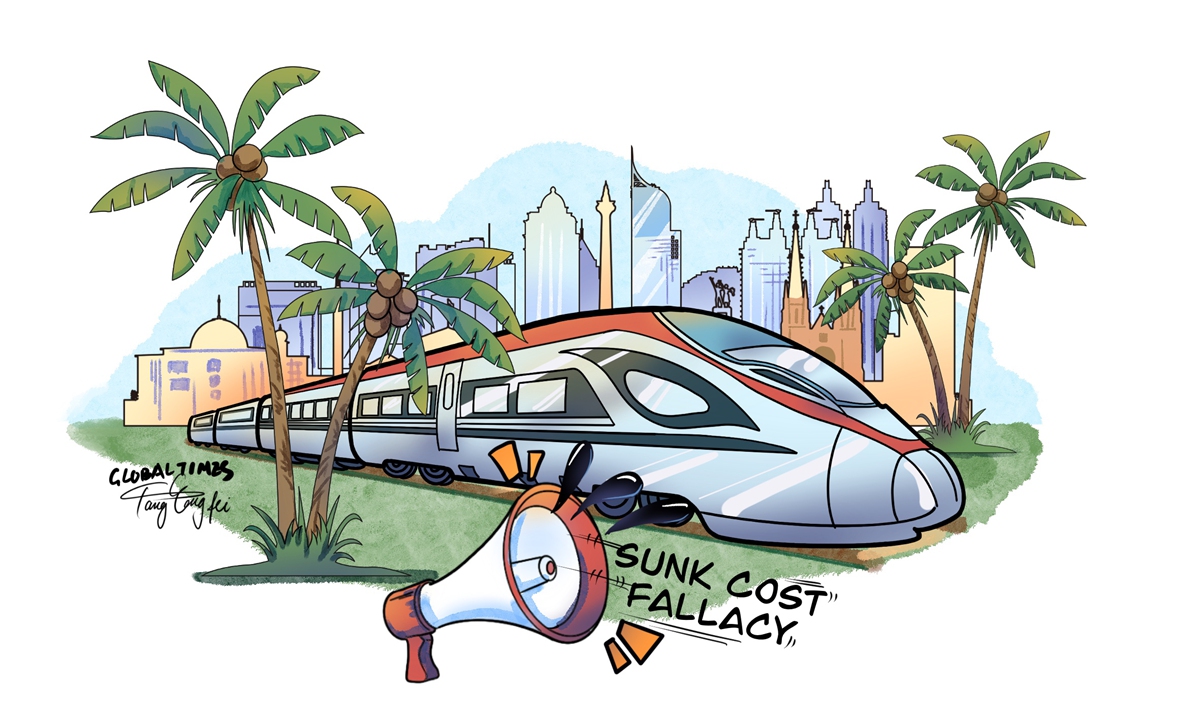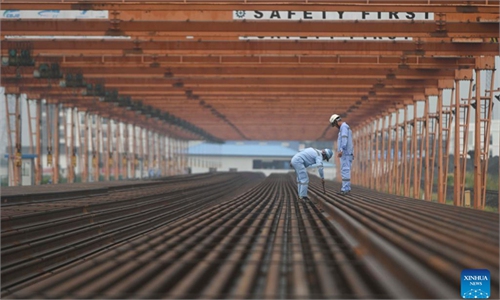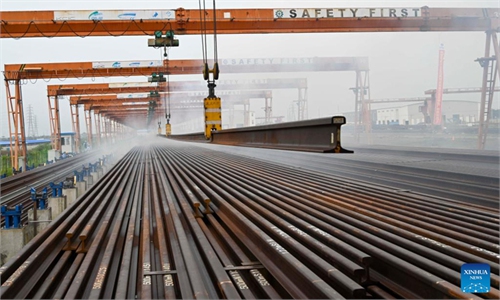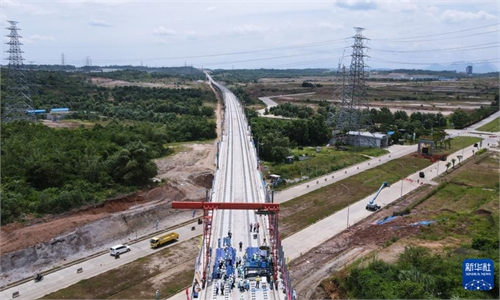
Illustration: Tang Tengfei/Global Times
Hyping so-called problems which include schedule delays and running over budget, US media outlet Voice of America on Wednesday accused the Jakarta-Bandung High-Speed Rail project of allowing Jakarta to fall into the "Sunk Cost Fallacy trap." Without any evidence, the piece claimed that China's Belt and Road Initiative (BRI) is facing increasing pushback by local Indonesians.While coming up with the new term of "Sunk Cost Fallacy," the VOA's malicious slander against the cooperation between China and Southeast Asian countries under BRI has once again revert to the clichés of "debt trap" rhetoric, a subject that is continually exaggerated by Western nations but simply does not exist in any of China's overseas projects.
The reason that Western attacks are so intent on targeting the Jakarta-Bandung High-Speed Rail project is because the particular and exemplary project is entering a sprint stage to complete construction and start service in July. These doomsayers will not let go of any piece of negative news about the project, using sensational headlines to attack and discredit BRI cooperation and China's overseas infrastructure projects. Latest example: The Nikkei reported last month that Indonesia high-speed railway still "beset by problems."
The anxiety and frustration felt by the US, Japan and other Western nations is not difficult to understand. Since the Western countries are lack of sincerity to deliver actual efforts and investment for overseas infrastructure projects, they are concern of the progress of BRI projects that is beneficial for regional prosperity and welcomed by the local people. However, it would be naive for Western countries to think that the confidence and motivation of China-Indonesia cooperation can be hindered by Western media's bad faith attacks and slander.
The reason for the continuous deepening of BRI cooperation between China and Southeast Asian countries is the complementary economic development needs and China's advantages in financing flexibility and infrastructure construction. More importantly, China's infrastructure cooperation with the Association of Southeast Asian Nations and other countries under the BRI framework is aimed at promoting regional interconnection and interaction and promoting sustainable economic development in the region, and there are no political conditions attached like Western countries.
Take the Jakarta-Bandung High-Speed Rail project as an example. Chinese companies won the $6-billion Jakarta-Bandung High-Speed Rail project by winning a public bidding process against Japanese companies. By connecting Jakarta the Indonesian capital with Bandung, the fourth largest city, it will be the first high-speed railway in ASEAN. Even the VOA admitted that the high-speed rail is expected to cut the travel time between Jakarta to Bandung from today's three hours to 40 minutes, alleviating traffic congestion in Jakarta and promote balanced regional development. Some experts noted that "economic growth belts" along the high-speed rail line will propel the formation of new economic corridors.
The Jakarta-Bandung High-Speed Rail project marks the first time that a Chinese high-speed rail project has been launched overseas with all elements and the whole industry chain, and it has also been welcomed by the local government. Indonesian Transportation Minister Budi Karya Sumadi last month said that the high-speed railway project progress has reached 86 percent completion and expects the railway system will elevate the country's overall competitiveness, according to media reports.
The Jakarta-Bandung High-Speed Rail is of vital significance to promoting Indonesia's economic development, and it is also a milestone in the cooperation between China and ASEAN countries under BRI. The success of the project will undoubtedly serve as a model for more infrastructure cooperation between China and Southeast Asian countries.
As Southeast Asia is in a critical period of development, China-ASEAN economic and trade cooperation is comprehensively deepening. Strengthening infrastructure, strengthening interconnection, stimulating economic development, and promoting regional economic development are the priorities that regional countries will pay attention to. The mutually beneficial cooperation and progress of local infrastructure projects like Jakarta-Bandung High-Speed Rail will not be thrown off course by vicious attacks based on ulterior motives held in the West.
The author is a reporter with the Global Times. bizopinion@globaltimes.com.cn



